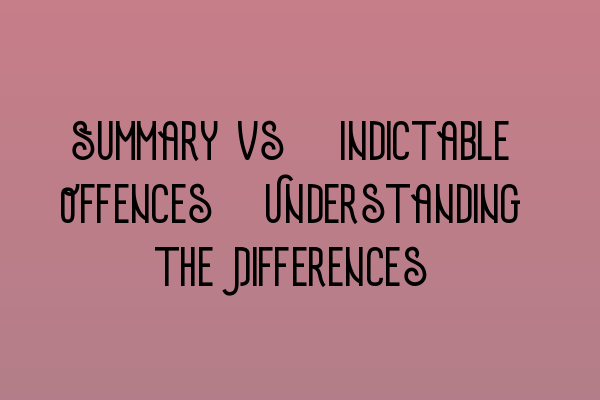Summary vs. Indictable Offences: Understanding the Differences
Welcome to the SQE Criminal Law & Practice Law UK blog! In this post, we will delve into the differences between summary and indictable offences in the UK legal system. Understanding these distinctions is crucial for anyone involved in criminal law, whether you’re a solicitor, law student, or simply interested in the subject.
Summary Offences
A summary offence, also known as a minor offence, is a type of criminal offence that is considered less serious in nature. These offences are typically heard in the Magistrates’ Court. Some common examples of summary offences include petty theft, disorderly conduct, and minor traffic violations.
One key characteristic of summary offences is that they can only be tried by magistrates, without a jury. Magistrates are trained legal professionals who preside over the Magistrates’ Court and make decisions based on the evidence presented to them. This system allows for a more streamlined process, as there is no need for a lengthy trial with a jury.
Summary offences usually carry less severe penalties compared to indictable offences. The maximum punishment for summary offences is generally limited to fines, community service, or a short prison sentence.
If you are facing a summary offence charge, it’s important to seek legal representation. SQE Criminal Law & Practice Law UK can provide expert advice and guidance in such cases. Our lawyers have extensive experience in handling summary offences and can ensure your rights are protected throughout the legal process. Legal Representation for Delaware LLCs in the UK: Expert Advice
Indictable Offences
Indictable offences, on the other hand, are more serious criminal offences that are heard in the Crown Court. These offences include crimes such as murder, manslaughter, rape, and large-scale fraud. Indictable offences are typically more complex and require a more formal and comprehensive legal process.
Unlike summary offences, indictable offences can be heard by a judge and a jury. The jury is responsible for determining the guilt or innocence of the accused based on the evidence presented during the trial. This jury system ensures a fair and impartial decision-making process.
Indictable offences carry more severe penalties, including longer prison sentences and hefty fines. In some cases, life imprisonment may be imposed for the most serious crimes. Due to the gravity of these offences, it is imperative to have skilled legal representation to navigate the complexities of the Crown Court system.
For expert advice and representation in indictable offence cases, SQE Criminal Law & Practice Law UK is here to assist you. Contact our team to ensure your rights are protected and to receive the best possible legal defense. Ensuring Ethical Business Practices: Delaware’s Code of Conduct.
Summary vs. Indictable Offences: Key Differences
Now that we have explored the basic characteristics of summary and indictable offences, let’s summarize the key differences between the two:
- Severity: Summary offences are considered less serious compared to indictable offences.
- Trial Process: Summary offences are heard by magistrates without a jury, while indictable offences are heard by a judge and a jury in the Crown Court.
- Penalties: Summary offences generally carry lighter penalties such as fines, community service, or short prison sentences, while indictable offences can result in longer prison terms and heavier fines.
To gain a deeper understanding of the British legal system, including insight into criminal law and other areas of practice, we recommend reading our comprehensive article on UK Criminal Law: An In-Depth Analysis of the British Legal System.
Additionally, if you are a UK business operating in the US or facing legal challenges in an international context, our article on Legal Challenges for UK Businesses in the U.S.: Strategies for Overcoming Hurdles provides valuable strategies and guidance to overcome obstacles and ensure compliance.
Thank you for visiting the SQE Criminal Law & Practice Law UK blog! We hope this article has shed light on the differences between summary and indictable offences. If you have any questions or require legal assistance, please do not hesitate to contact our team.
